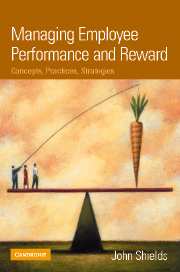Book contents
- Frontmatter
- Contents
- List of figures and tables
- Foreword by John Egan
- Acknowledgements
- Introduction: Setting the scene
- Part 1 The fundamentals
- Part 2 Performance management in action
- 5 Managing for results
- 6 Managing behaviour
- 7 Managing competencies
- 8 Performance review and development
- Case study. Delivering fairness: Performance assessment at Mercury Couriers
- Part 3 Base pay and benefits
- Part 4 Rewarding employee performance
- Part 5 Fitting it all together
- Model responses to case studies
- References
- Index
5 - Managing for results
from Part 2 - Performance management in action
- Frontmatter
- Contents
- List of figures and tables
- Foreword by John Egan
- Acknowledgements
- Introduction: Setting the scene
- Part 1 The fundamentals
- Part 2 Performance management in action
- 5 Managing for results
- 6 Managing behaviour
- 7 Managing competencies
- 8 Performance review and development
- Case study. Delivering fairness: Performance assessment at Mercury Couriers
- Part 3 Base pay and benefits
- Part 4 Rewarding employee performance
- Part 5 Fitting it all together
- Model responses to case studies
- References
- Index
Summary
Since results are the most tangible and readily measurable of the horizontal dimensions of performance, we shall begin our discussion at the end, as it were, by examining in this chapter those approaches to performance management that are results-focused, including both those that focus on individual results and those that are associated with group and organisation-wide results. The chapter begins with an overview of those facets of work performance that are commonly characterised as ‘results’. Next we consider some of the key concepts associated with defining and measuring results, the promise and perils of results measurement, and the requirements for measurement reliability. The remainder of the chapter is then devoted to a discussion of two of the most widely applied results-based performance measurement and management methods, namely goal-setting and the balanced scorecard.
What are ‘results’?
In terms of the (prescriptive or descriptive) conception of work as a linear value-adding process, ‘results’ can be defined as those tangible and intangible outcomes from work behaviour or activity that management deems desirable and valuable in achieving organisational objectives. Conceived thus, the results domain may be seen as covering six main outcome categories:
1 product or service quantity
2 product or service quality
3 financial outcomes
4 timeliness
5 innovation
6 stakeholder reactions.
Here, we have adapted the taxonomy of key human performance outcomes identified by Fitz-enz (2000: 91–128), which lists generic human resources ‘value adding’ factors: ‘cost’, ‘time’, ‘quantity’, ‘error’ and ‘reaction’.
- Type
- Chapter
- Information
- Managing Employee Performance and RewardConcepts, Practices, Strategies, pp. 121 - 141Publisher: Cambridge University PressPrint publication year: 2007



